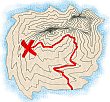 |
free plans: Treasure Hunt Ideas |
| Basic Description |
Gifts are often wrapped in an attempt to incorporate an element of surprise
into the gift-opening process. Unfortunately, after a few seconds, the contents of the package
become known and the anticipation subsides.
In the plan below, we show you how to
extend and enhance the anticipation.
Perhaps, more importantly, giving a gift via a treasure hunt
injects a substantial dose of meaning into the process
that is sure to be appreciated.
Our extensive list of ideas will allow you to customize a hunt for anyone. |
getting started
Before you begin, you need to think about on the recipient and the
steps that you plan on requiring. Below, we have listed
all sorts of ideas, some of which may not be suitable for everyone. Think about what interests
your recipient and how long an attention span they possess. Perhaps you should give a smaller gift
along the way to make sure that the destination always seems near -- this will keep them going
through difficult steps if you choose to design them in. We also recommend that specify
on each instruction, which step she are on, so the recipient always knows where she is
in the process. You can make the hunt as easy or as difficult
as you wish, and you can also control the length of time it should take to reach the treasure.
The most critical tip that we have discovered, is that it is best to start from
the destination and work your way backward. With this method, you will know all the details about any given
step before you write the instructions for it. So, for instance, if you hide the gift in a box in
the refrigerator, prepare it and put it there; only then should you write the instruction
on how to find it. Then hide that
instruction somewhere, say in the planter, and write the next instruction on how to find the instruction
in the planter. By working your way backwards, and hiding an instruction first, you are in a position to
clearly describe all relevant information.
Its also a good idea to create a general plan in advance, but remain flexible
because you
may come up with additional ideas along the way. Planning is a good idea because it allows you to make
one trip to a instruction location while the recipient may have to make many. For example, one
time we set up a treasure hunt for someone that had seven steps. All of the instructions were in two
locations: her home and that of her parents who she visited almost daily. The
instructions, however, led her back and forth between homes to find the subsequent note,
and the whole process took her about ten days. Since we planned everything in advance,
it only took us one trip to each home to place all of the instructions.
It is also a good
idea to keep a log of all the steps and all the instructions. This log will serve
as a backup in case an instruction was taken by someone else. If the recipient notices that an instruction
is missing, you can refer to the log to send her back on her pursuit of the next
instruction. |



